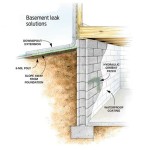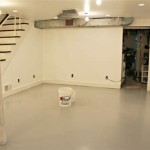Waterproof Flooring for Basements
Basements are often susceptible to moisture and water damage due to their location below ground level. Installing waterproof flooring in your basement is crucial to protect it from moisture and ensure its longevity. This article will guide you through the various types of waterproof flooring available for basements, their benefits, and factors to consider when making your choice.
Types of Waterproof Flooring for Basements
1. Vinyl Flooring: Vinyl flooring is a popular choice for basements because it is highly water-resistant and durable. It comes in various styles, including planks, tiles, and sheets, providing versatility in design. Vinyl flooring is relatively easy to install and maintain, making it a convenient option.
2. Laminate Flooring: Laminate flooring consists of multiple layers, with a water-resistant core. While it is not fully waterproof, it can withstand spills and moisture well. Laminate flooring offers a wide range of styles and finishes, making it suitable for different aesthetic preferences.
3. Tile Flooring: Ceramic and porcelain tiles are inherently waterproof, making them an excellent choice for basements. They are durable, easy to clean, and resistant to moisture and stains. Tiles come in a variety of colors, patterns, and textures, allowing for customization.
4. Epoxy Flooring: Epoxy flooring is a seamless, self-leveling coating that is highly resistant to water. It is durable, easy to maintain, and can be customized with various colors and finishes. Epoxy flooring is often used in commercial applications but can also be suitable for basements.
Factors to Consider when Choosing Waterproof Flooring for Basements
1. Moisture Level: Assess the moisture level in your basement before selecting flooring. If your basement is prone to flooding or excessive moisture, you will need a highly waterproof flooring option like epoxy or vinyl.
2. Budget: Waterproof flooring options vary in cost. Consider your budget and allocate accordingly. Vinyl and laminate flooring are generally more affordable than tile or epoxy flooring.
3. Style and Design: Choose a flooring style that complements your basement's overall design and aesthetics. Consider the color, texture, and pattern of the flooring to create a cohesive look.
4. Durability: Basements are often subjected to heavy foot traffic and activities. Ensure that the flooring you choose is durable and can withstand potential wear and tear.
5. Installation: Consider the ease of installation when choosing flooring. Some options, like vinyl planks, can be installed as a floating floor, while others, such as tile, require professional installation.
By considering these factors and researching the different types of waterproof flooring available, you can make an informed decision that protects your basement from moisture damage and enhances its functionality and aesthetics.

Thermaldry Basement Flooring Systems Waterproof

5 Best Flooring Options For Basements Floors2day

Best Flooring For Basements That Flood Try Waterproof Vinyl

Guide To Waterproof Basement Flooring Quality Installs Inc

The Best Flooring Options For Your Basement

6 Inspiring Ideas For Basement Flooring In Portland

Thermaldry Basement Flooring Systems Waterproof

The 10 Best Basement Flooring Options Girl

The Best Basement Flooring Options For Your Home

Homespec Waterproofing And Foundation Repair Basement Photo Album Waterproof Flooring Installed In Westland Mi








